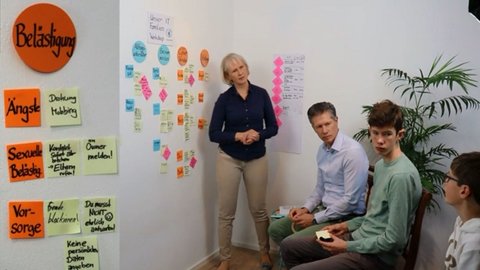27 February 2019
Guides for smartphones in the Family: An Interview
Each family member stares at their own mobile phone: Snapchat with friends, checking mails while eating, Fortnite gaming in the evening and 24/7 voluntary WhatsApp readiness.

That's the average way smartphones are used in the modern family world, isn't it?
"There must be solutions for families that do not always end in conflict between parents and children," Christian Eineder thought some time ago, recalling successful workshops with employees on explosive topics in his working world. Why shouldn't critical topics also be solved in a cooperative group in the family team? Together with his wife and their two sons, he proves that effective strategies can be used to jointly dose and organise the use of digital media in the family.
Mr Eineder, how did your project "Internet Agenda for Families" come about?
I don't just observe it in my own family. The dosed handling of the attention-grabbing digital media challenges parents. Children and young people simply find smartphones, tablets and the like much more exciting than homework and homework. Of course we parents can understand that. The question every day is how everything fits together and how our children spend a balanced day. We didn't learn that from our parents either and are therefore allowed to find our own solutions.
You have developed practicable strategies for your family - how did you proceed?
I have noticed: Effective solutions that work in the long term are developed by parents and children together. The children's ideas should definitely be incorporated, as self-awareness is the strongest learning motor. Self-developed solutions drastically increase the probability of implementation. We have chosen a relaxed weekend and taken a lot of time to collect the positive and negative components of digital media - including smartphones in general, Internet use, TV and computer games - and to establish concrete rules on screen time in our family.
And that really goes without a hassle?
With a clearly structured process and a defined goal, there is enough room and clarity for open discussions - actually without arguments. Children find their way just as well in this atmosphere as adults.
How can other parents benefit from your experience? Do you share your experiences?
Yes, that is our philosophy. easyfaM is there so that parents can let themselves be inspired by the positive experiences of other parents without feeling it as interference in their upbringing. My family and I have shot coaching videos for parents on many different topics. Step by step we describe the most successful strategies in dealing with difficult topics in the family. Families with children from 3 to 16 years should profit the most from it.
And what about discipline in complying with the agreed rules? Who monitors this?
Once the first important step has been taken in defining and agreeing on the rules together, it is crucial to visualise the current status. A clearly visualized overview, visible to everyone at all times, avoids unnecessary discussions and helps us and the children to regulate ourselves, or to learn this bit by bit. On the subject of breaking rules, for example, our children have suggested that those who do not abide by the rules lose their remaining free weekly computer game time and are no longer allowed to play during this time. By giving the children a say in the creation of the rules, they also adhere to them.
And the parents? Does this mean that your smartphone is not at the dinner table?
If we want to be a role model for our children, we adults must also adhere to the agreed rules. Children imitate what we parents show them - we must clearly recognize our responsibility in this respect. During mealtimes, mobile phones have no place at the dining table. This also means respect for the person we are talking to. Because of its importance we take up the topic in several videos, for example also in "Playfully to better manners" and "Future trends and their effects on our children".
What is your best tip from father to father?
Always get your own picture of the hottest tools, be they video games, series or social media channels. Stay in touch with your children and then decide whether you think they can handle you responsibly.
